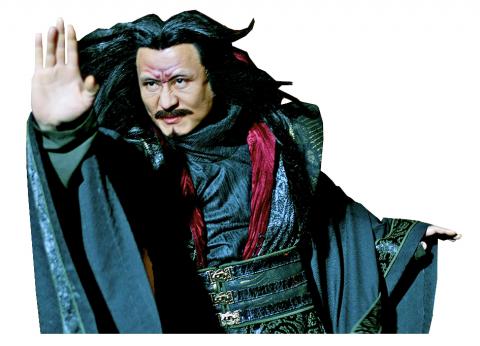This week’s gossip begins with celebrity drug trouble, and ends with one angry mother.
Veteran actors Coco Sun (孫興) and Mok Siu-chung (莫少聰) of Hong Kong made headlines after they were arrested in Beijing last month on suspicion of possessing and consuming illegal substances. On April 15, the police collared Sun for allegedly having marijuana and ketamine in his apartment. The 47-year-old actor soon admitted that he has used various kinds of drugs for the past five years to give himself “energy” as his two failed marriages have exhausted him.
Mok was arrested on the same day for marijuana use. The 50-year-old actor said he only smoked a joint that a friend gave him at a party out of politeness, adding that it was his first time. According to some media reports, the bust was a setup intended to teach the lothario a lesson.

Photo: Taipei Times
The arrests sent the Chinese showbiz world into a frenzy, according to Chinese media. It is reported that Sun, who could face life imprisonment, turned stool pigeon and named other celebrity druggies and his dealers — including a “heavyweight star” — in the hope of receiving a lighter punishment. Many stars and celebrities have reportedly fled China’s capital. For the record, Sun says he didn’t snitch.
Mok was released on Saturday after a 14-day stint in the Chaoyang District Detention Center. As for Sun, Chinese media speculate that the most credible scenario is one year in rehab.
Meanwhile, back in Taiwan, Chinese restaurateur Zhang Lan (張蘭) came face-to-face with local media still upset about how they were treated during the March 22 wedding of her son, Wang Xiaofei (汪小菲), and Barbie Hsu (徐熙媛, aka Big S). Zhang was in town over the weekend for a business meeting. Though gossip hounds have put her under a microscope, the 54-year-old businesswoman started off the trip coming across as self-assured and talked confidently.
On Friday last week, Zhang revealed her plan to open five to 10 restaurants in Taiwan in the next three years. “I will bring the best Chinese cuisine to improve Taiwanese people’s palate,” she said. And after an earthquake on Saturday, the entrepreneur was quoted as saying: “I like earthquakes. I bring earthquakes because I am full of energy.”
But the attention seemed to get too much by Sunday, when local media reported that a journalist asked why Wang only gave part of the wedding money he and Big S received to charity, after the couple had promised to donate it all. “I think you are very unkind … I am an entrepreneur, not your prey,” Zhang was quoted as screaming. “I am pissed off!”

That US assistance was a model for Taiwan’s spectacular development success was early recognized by policymakers and analysts. In a report to the US Congress for the fiscal year 1962, former President John F. Kennedy noted Taiwan’s “rapid economic growth,” was “producing a substantial net gain in living.” Kennedy had a stake in Taiwan’s achievements and the US’ official development assistance (ODA) in general: In September 1961, his entreaty to make the 1960s a “decade of development,” and an accompanying proposal for dedicated legislation to this end, had been formalized by congressional passage of the Foreign Assistance Act. Two

March 31 to April 6 On May 13, 1950, National Taiwan University Hospital otolaryngologist Su You-peng (蘇友鵬) was summoned to the director’s office. He thought someone had complained about him practicing the violin at night, but when he entered the room, he knew something was terribly wrong. He saw several burly men who appeared to be government secret agents, and three other resident doctors: internist Hsu Chiang (許強), dermatologist Hu Pao-chen (胡寶珍) and ophthalmologist Hu Hsin-lin (胡鑫麟). They were handcuffed, herded onto two jeeps and taken to the Secrecy Bureau (保密局) for questioning. Su was still in his doctor’s robes at

Last week the Democratic Progressive Party (DPP) said that the budget cuts voted for by the China-aligned parties in the legislature, are intended to force the DPP to hike electricity rates. The public would then blame it for the rate hike. It’s fairly clear that the first part of that is correct. Slashing the budget of state-run Taiwan Power Co (Taipower, 台電) is a move intended to cause discontent with the DPP when electricity rates go up. Taipower’s debt, NT$422.9 billion (US$12.78 billion), is one of the numerous permanent crises created by the nation’s construction-industrial state and the developmentalist mentality it

Experts say that the devastating earthquake in Myanmar on Friday was likely the strongest to hit the country in decades, with disaster modeling suggesting thousands could be dead. Automatic assessments from the US Geological Survey (USGS) said the shallow 7.7-magnitude quake northwest of the central Myanmar city of Sagaing triggered a red alert for shaking-related fatalities and economic losses. “High casualties and extensive damage are probable and the disaster is likely widespread,” it said, locating the epicentre near the central Myanmar city of Mandalay, home to more than a million people. Myanmar’s ruling junta said on Saturday morning that the number killed had